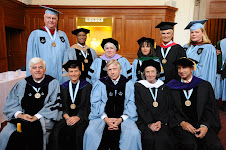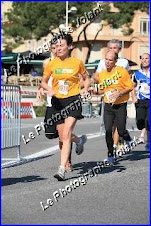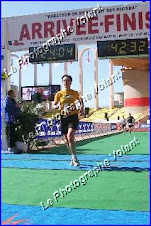When Priscilla invited me to join her for the polyphonic chant festival in Corsica, she did so with a measure of intent. For, as she says, she would not share this particular music with just anyone. Knowing that I sing in choruses, and have heard and enjoyed the Corsican music that she has shared with me, she felt comfortable introducing this “recontres” (translated literally, “meeting,” but we would say “festival” probably). This was the 20th year of the festival, but that does not mean it has matured into some sleekly run event with big name sponsors and recording labels. The sponsoring group is the 10-voice Corsican group, A Filetta, which has a solid musical reputation on the island. The eight concerts – two each evening, one at 6:00 and one at 9:30 – were staffed largely (as usual) by local volunteers recruited by A Filetta, which led to some pretty interesting organizational decisions during the four days of music. But more on that later.
The festival opened on September 9th with a concert in another Corsican town, Bastia, apparently an effort to broaden the reach of the event beyond Calvi, which sits on the island’s northern coast. Calvi’s location makes it easy to reach by ferry from the mainland (France or Italy), but it is fairly distant (a few hours drive) from the other towns on the island. The Tuesday night concert featured A Filetta and an Italian performer, Daniele di Bonaventura, on an accordion-like instrument called the “bandonéon.” We heard Daniele on the final night of the festival, in a round-up of the week’s musicians. Apparently he is an incredibly accomplished musician, but Priscilla and I both thought his appearance on this particular bill was, well, interesting. It was not the first time we had had this reaction to a performer.
We purchased a subscription for the whole week of performances, and learned that this would give us preferred seating in the concert venues. In each instance, we made an effort to sit as close as possible to the performers; as Priscilla pointed out, this allowed one to fully view their facial expressions and hear what they were singing. For this type of music, that mattered. A note on concert organization here: As subscribers, we were given a sturdy “bracelet” to wear on our wrists for the duration of the festival (mine made it through several swims, runs and showers), which was ostensibly to make it easier for the concert staff to know who was to be let in the door and shown to the reserved seats (at each concert, 5x7 sheets printed with the word “Abonnés” - “subscribers”- were taped to the first several rows of seats). In practice, although we were waved into the concert venues once we showed our bracelets, we were also expected to take a serrated ticket from a staff member, which was then split and one half collected, apparently to keep count of how many of the subscribers actually attended. This mystified us, and although we didn’t take note of this particular practice, at one point we were gratified to have picked up tickets as we entered through a gate on our way to a venue, because those subscribers at the door to the church who hadn’t done so, were told to return to the gate to get a ticket. A cause for great confusion, and more than a few disgruntled subscribers!
The first concert in Calvi was advertised as “Chants de Bretagne et d’Occitanie” – regions in France known to us Anglos as Brittany and Provence. Pris and I arrived just as the concert was about to start that night – we had decided to have dinner at our campsite before the 6 p.m. concert, and somehow the plan to arrive early so as to get seats up front was delayed by a lovely pesto pasta and fresh salad. That being said, when we showed our tickets at the door that evening, we were escorted up to the front of the crowded Oratoire, and shown seats on the side benches that afforded us a pretty decent view of the performers, Yann Fañch Kemener (Bretagne) and Renat Sette (Provence). The two men were accompanied by two other musicians, who played period saxophones, oboes and clarinets. They each sang in their native tongue; all the French regions appear to have some type of dialect, and the singers, like the other performers that followed that week, including the Corsicans, through their music keep that language alive. Many of the songs this night sounded like the medieval songs that we are familiar with in the States played at Renaissance festivals and by “early music” groups. In one amusing selection, Yann and Renat performed a familiar song, reminiscent of “The Twelve Days of Christmas,” about biblical prophets and characters, in counterpoint, singing the verses alternately each in their native tongue. The audience loved it.
After the program, one of the concert staff joined the musicians on stage and engaged them in a discussion of their music. This “talk-back” session, as we are wont to call them in the States, occurred at each 6 p.m. performance subsequently. Designed to be more casual and, to my mind, as a way to introduce these lesser known stars to the audience, the question and answer sessions at the 6 p.m. performances were generally engaging and did indeed give the singers a chance to connect with the audience in a different way, and explain what they were doing on stage. In some instances the discussions were quite lengthy, depending on the audience interest and/or its unfamiliarity with the group.
The 9:30 concert that first evening was held in the much larger Cathédrale in the center of the Citadelle in Calvi. The advertised performers were “Les Voix de Géorgie,” or The Voices of Georgia. Pris and I sat in the third row center (she had jostled for the seats with another subscriber, as I had taken some time to walk through downtown Calvi between performances), with a great view of the stage. We were the lucky ones; the staff scrounged for seats for the huge audience, delaying the start of the show until nearly 9:45 p.m. When a group of men dressed in black came onstage and began to sing, I was impressed, thinking these were the men of Georgia. After a few songs, one of the men spoke in French, and I thought, wow, pretty cosmopolitan of them. And then they left the stage, and a huge group of big guys all dressed up in (what I would recognize as) Russian coats and boots, with swords hanging from belts on their wide girths, walked in – then I realized that I had just heard A Filetta, who I had forgotten sing a few songs as part of each evening’s late performance. But the Georgians were great big voices that reminded me of the Tchaikowsky and other Russian composers’ choral pieces that I have sung. The crowd loved them, and I thought that the recent crisis in Georgia probably magnified the support of the audience. At the end of the very late night, A Filetta joined the Georgians on stage to sing a Corsican song with them, and the applause went on long and loud afterward. We didn’t get back to our campsite until after midnight that night – which meant that we had to park at the front of the campground (no cars allowed after 11 p.m.) and walk back to our tents – but in the light of the waxing moon, it was a nice way to wind down the evening.
The Day Two six p.m. program was headlined by a local Corsican group called Tavagna. Due to the group’s and the music’s popularity, this concert was held in the Cathédrale instead of the smaller Oratoire. We once again had our dinner before the concert, and arrived just before the concert began, but were able to find seats up front on the right hand side of the nave, which also allowed us to stretch out our legs (the seats in the nave generally were very close to each other!). Tavagna is a group like A Filetta and Alte Voce (see earlier blog post), men who sing the traditional Corsican polyphony. Each group has its own signature sound and repertoire, but in this performance, Priscilla and I both wondered what this was for Tavagna. Their performance, while professional, was listless and uninspired. Afterward, I resolved to buy an Alte Voce CD (not a Tavagna disc), deciding that the spirit and inspiration that I heard in FanFan and Jean’s music a few weeks earlier made up for any stray disharmonies in their performance. There was a short talk-back session during the concert, but clearly the audience here was experiencing what we were, and there was no prolonged effort to get them to perform encores.
Priscilla and I had tea and coffee, respectively, at a small café across from the Cathédrale between performances, specifically situating ourselves near the front of the line to go into the cathedral for the 9:30 show. Actually, we had left some clothing to reserve our seats in the front row after the 6 p.m. concert, and hoped that the scrum would not disregard our attempt to mark our spaces! Indeed, the Cathédrale filled up for the 9:30 show. The program this night featured two groups performing music from the same office of the Latin Mass – the Tenebrae service from Holy Week. The altar was set up with a candelabra and candles on the railing, as it would be for the service of Light. The brothers from the Confrérie Sant’Antone abate (abbey) in Calvi began by singing the traditional Latin chant and polyphony of the service. The music had a familiar sound to me, having sung many masses in my choral literature. Afterwards, A Filetta performed a few songs of a sacred nature (I am guessing, given the tone of the evening). Then the second featured group appeared on stage: Doulce Mémoire, to perform “Leçons de Ténèbres” by Cristobal Morales (1500-1553). There were seven singers and five musicians who played various long, flute-like instruments that looked like bass recorders to me (one of them dwarfed the short, slight woman playing it). The music was mesmerizing and performed flawlessly, with smooth stage moves as the singers and musicians alternated places and the leader slowly doused the candles on the railing throughout the service. The audience tried to maintain a respectful silence, but it was a very long performance, and a good number of the crowd left (conspicuously) midway through the service. When the last candle was snuffed out, and the clanging of the steel indicated that the service was over, the audience stood and applauded its praise for this amazing group. But, given the late hour – almost midnight – the crowd did not prolong its enthusiasm.
Friday’s 6 p.m. performance in the Oratoire was by a women’s group called La Mal Coiffée (The Bad Hair, literally). The six women reminded me of the a capella women’s groups I have seen; each of them were dressed a little differently, in counter to the all-black garb of the men’s groups we had already seen. They sang in Occitane (Provencal), and, like the other groups, are working to preserve the songs of their heritage in southwest France. Pris and I arrive a bit late for this show, but are still able to get bench seats not too far from the stage. The talk-back during the performance is engaging, as the women are quite animated and clearly enjoy themselves on stage. But this is the shortest program of the week; we learn they have just released their first CD, and my guess is that they are just beginning to develop the polish of a professional group. The copious drinking of water from water bottles on stage between songs is yet another sign to me that this is a group not quite ready for prime-time.
As we leave the 6 p.m. show, there is a question from the audience about where the 9:30 show will be held; the skies are threatening outside, and there is a stiff wind that we could hear throughout the women’s performance. We are told that it will be held in the Cathédrale; Pris and I for the first time return to our campsite between shows, as we had spent the day on the road visiting Rosanna in Corte. We decided to get a pizza at the campsite café before we return for the evening performance; literally in minutes after ordering, our thin (and I mean thin) crust pizza arrived with its mushrooms and olives. Consumed quickly, we head back to town for the next show.
We drive back to the Citadelle by 8:30 and join a line of folks waiting to get, it appears, onto the Place d’Armes, an open air plaza in the center of the citadel, which has been prepared with a stage, lighting and amplifiers. When the line is finally allowed into the Place, we learn that we subscribers should go to the Oratoire and the rest of the paying audience will sit in the Cathédrale, it having been decided that the weather is too iffy for an outdoors show. The idea is that the performers will move between venues. That sounds crazy to us (although the approach works fine the following evening). And indeed, around 9:30, after we watch a group of techies take microphones off the stage, we learn that the decision has been made to have the show on the plaza after all, and we all move as quickly as possible to the open air site. The wind is whipping around, but there is no rain, and the full moon is rising in the east. It’s actually quite a magical evening, if you ignore the physical jockeying for prime seating in front of the stage, the general grumping amongst the subscribers about the concert staff and their inability to make decisions and make us happy, and the dropping temperature as the wind grows in velocity (remember, we are sitting in the highest point of this part of the island!).
The featured Friday night performer is a musician from Ile de la Réunion (Reunion Island), Danyel Waro. The aging, draft-dodger hippie with dreadlocks is backed up by a band of percussionists who look like rock stars – good looking guys who have that casual stance that says “I know I am cool.” The four backup guys are excellent musicians, but both Pris and I are ready to leave after about 30 minutes of the music; it definitely does not do anything for either of us. The sound is an island, rhythmic, sound, and A Filetta backs up the band with vocals on a few of the songs, which is far afield from their Corsican polyphony, but they are clearly enjoying boogeying to the drums – and a few of them literally are dancing on stage. The crowd, mostly the concert staff, we note, are gyrating to the beat in front of the stage as well. Again, not our thing, and we get up and leave the venue around 11:30 (I guess we listened for longer than 30 minutes).
Saturday is the last day of the festival, and Pris and I spend most of Saturday driving down and back up the west coast of the island to see her friends in Ota. We have a great time with the family, and so leave a little later than planned, but Pris gets me to the 6:00 p.m. concert that night so I can hear the other female group, Norn lod: “when three sorceresses of the North invent a language.” The three women in long black dresses move fluidly together in choreographed movements and sing hauntingly in a language that I certainly don’t understand; the extended question and answer period afterward makes it clear to me that the audience is also intrigued and somewhat dumbfounded about what they are hearing and seeing. But the audience is also appreciative, and gives the group solid and sustained applause after the show.
Priscilla joins me for the final show of the evening; as advertised, we will see all the participants from the week for reprise performances. But our assumption that that the evening will include all singers from the eight performances is wrong; only the 9:30 p.m.-featured groups are listed on the program. This evening, due to threatening rainstorms, the staff ably separates the crowd, seating the subscribers in the Oratoire and the other concert-goers in the Cathédrale. We sit in the third row, across the aisle from each other, which makes whispering during the performance a little awkward – which is what I try to do when the first performer comes on stage and begins to sing. It is another aging crooner, singing what sounds like Parisian love songs. Turns out that Gabriel Yacoub built a reputation in the 70’s by singing the songs of the French, when everyone else at that time was performing American music. He was backed up by four brass players; the arrangements for them were not challenging, but the music was pretty, and very much a change from polyphony we had heard just a few nights ago.
The rest of our program includes a reprise of the not so compelling Danyel Waro with his cute rhythm guys; Daniele, the accordion guy we hadn’t heard before (and wondered why we were hearing him now); A Filetta (to rousing applause); and finally, the Georgians, to even greater applause as we hear again their very limited repertoire. The A Filetta leader gives a short speech before they sing, thanking the audience for being there, for their tolerance of the shortcomings of the concert organization (without naming specifically the concert staff), and for helping to continue the tradition of polyphony here in Corsica and around the world. It was a satiating evening of music, capping off for me, an intriguing and ear-opening four days of music in Corsica.
[apologies for my inability to decide to write in past tense or present tense...]
Sunday, September 21, 2008
Subscribe to:
Post Comments (Atom)





















































































































































































No comments:
Post a Comment